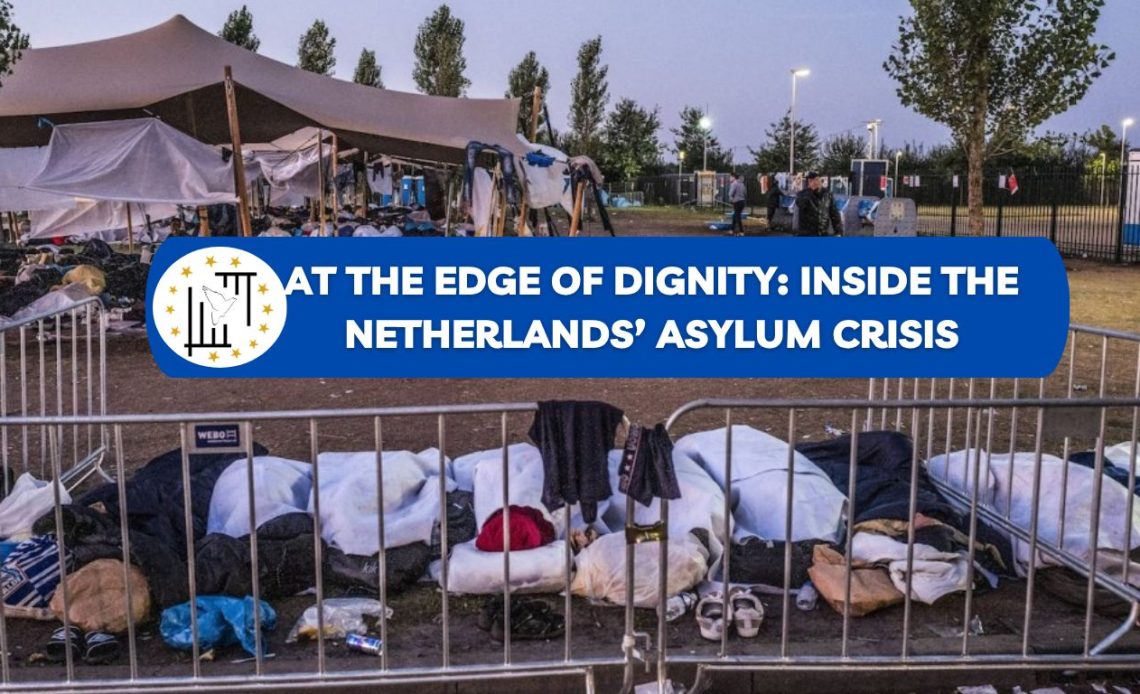For years, the Netherlands has prided itself on its strong human rights tradition, however images released in the summer of 2022 from the small northern town of Ter Apel told a different story. Hundreds of asylum seekers, including families with toddlers, unaccompanied minors and pregnant women, were forced to sleep outside the national registration centre for several nights. In one of Europe’s wealthiest nations, people seeking safety were left lying on the grass without shelter, food or sanitation.
What began as a shocking moment of public outrage has since hardened into a structural failure. Three years later, the Dutch asylum system remains overcrowded, overstretched and, according to national courts and oversight bodies, dangerously close to breaching basic human rights obligations.
A Crisis That Never Ended
By 2025, nearly 77,000 people were living in asylum facilities that were not designed for such high capacity. Many were housed in converted gyms, tents or empty office buildings, and roughly 40 percent remained in emergency “crisisnoodopvang” shelters that were intended for temporary use. Inspectors from the Health and Youth Care Inspectorate (IGJ) described “hygiene that leaves much to be desired” and “little to no privacy,” while the National Ombudsman warned that “fundamental rights are being violated because essential provisions are missing.”
The government has repeatedly blamed a shortage of housing and local resistance from municipalities unwilling to host new centres. But the courts have made it clear that such excuses do not absolve the State of responsibility. In 2022, the District Court of The Hague ruled that the Netherlands had failed to meet even its statutory minimum standards for humane reception, while a Groningen court later imposed daily financial penalties for continued overcrowding at Ter Apel. Judges concluded that resource shortages cannot justify exposing people to degrading conditions.
Life in Limbo
The physical discomfort is only part of the ordeal for those waiting on a decision on their asylum claim. The psychological cost is also immense. Asylum seekers interviewed by VluchtelingenWerk Nederland described a paralyzing sense of limbo and loss of control. “Sometimes I feel like I’m not even there,” said one mother who had been separated from her children for over two years.
Most asylum seekers now wait well over a year (and in some cases nearly two) for their claims to be processed. Frequent relocations and isolation compound their distress, and mental health workers have warned that the system itself has become a source of trauma.
Children are among the most affected. By 2025, more than 7,000 minors were living in temporary shelters, many without access to stable schooling, sleep, or play spaces. Inspectors found that some children were moved as many as four or five times a year, leaving them “structurally overtired” and at risk of lasting developmental harm. For families, prolonged delays in reunification have deepened the pain. One father told VluchtelingenWerk, “My daughter doesn’t recognise me anymore.”
Legal Promises, Political Erosion
The legal framework makes clear that under Article 3 of the European Convention on Human Rights, states must prevent inhuman or degrading treatment, regardless of political or administrative pressure. Yet Dutch policy has increasingly leaned towards deterrence rather than protection.
The Spreidingswet, or Distribution Act, introduced in 2024 to ensure fairer allocation of reception responsibilities across municipalities, initially improved capacity and cooperation. But following the formation of a new right-wing coalition later that year, the government announced plans to repeal the law.
In its place came the Asylum Emergency Measures Act, which reduced residence permits from five to three years, restricted family reunification, expanded the use of detention, and capped UNHCR resettlement to just 200 people a year. Both UNHCR and VluchtelingenWerk warned that the measures would intensify the crisis, not solve it. “The approach prioritises political messaging over structural solutions,” VluchtelingenWerk stated.
From Oversight to Obligation
The crisis has not only tested the limits of political will but also exposed the boundaries of legality. Courts have repeatedly found that the State’s failure to provide adequate living conditions breaches its obligations under Article 3 ECHR. In one case, the Groningen court imposed fines of €15,000 per day for overcrowding at Ter Apel, a penalty which was upheld by the Court of Appeal in 2025. Inspectors continue to warn that overcrowding, long waiting times and poor hygiene pose serious health risks, especially for vulnerable groups.
Behind every statistic is a person trying to rebuild their life after displacement. Many arrived in the Netherlands seeking protection, only to face a new layer of hardship created by bureaucratic inertia and political hesitation. What they experience is not a temporary emergency but an erosion of dignity, one that challenges the country’s reputation as a defender of human rights.
A Crisis of Dignity
The Netherlands’ asylum system now stands at the edge of dignity: still functioning, still bound by law, but sustained by crisis management and exhaustion. It is a system that meets its obligations only on paper, while people in its care sleep on camp beds and wait months for basic medical attention.
The Netherlands has the laws, resources, and experience to do better. What remains to be seen is whether it has the resolve.
Pour lire l’intégralité de notre rapport, veuillez cliquer ici.

